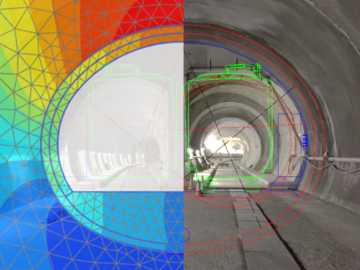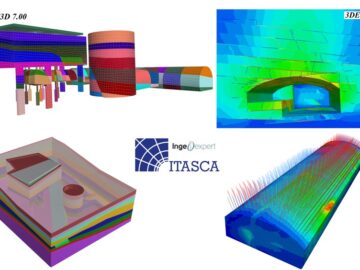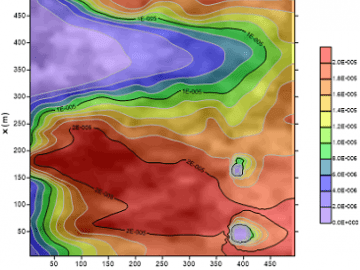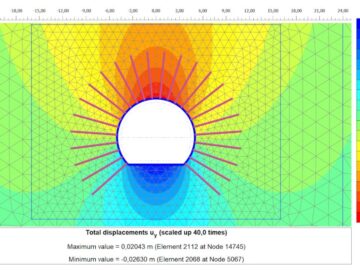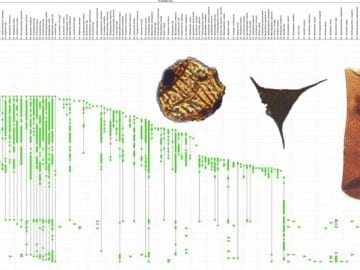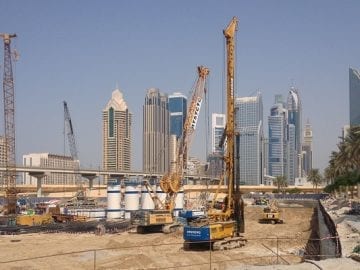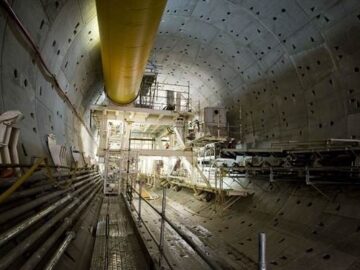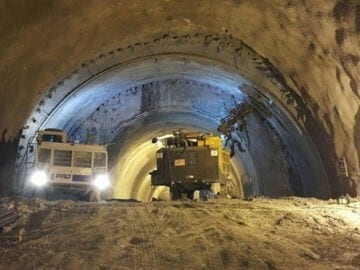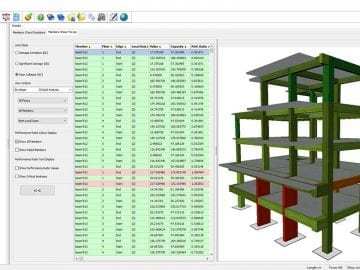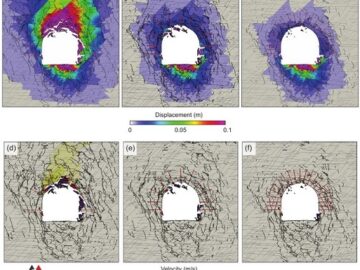From Economic geology to Geophysics and Structural geology, among others, here you will find courses that fit your needs
Geology Courses
Geology is the science of the ground beneath our feet: the physical substance of the Earth, the processes that formed and continue to form its structure, and the ways humanity interacts with it. Nearly everything in our modern built environment relies on our understanding of these mechanisms—our roads, buildings, dams, and tunnels quite literally rest upon them. A solid grasp of the movement, compressibility, and strength of soil permits the design of large structures. Considering the effects of seismic activity saves lives and protects buildings from damage. Studying the history of the earth’s formation gives engineers the knowledge to find and extract petroleum, protect groundwater resources, and build tunnels and bridges through even the most impassable terrain. Analyzing the behavior and strength of rock formations is critical to designing safe and reliable structures. Geology, therefore, is a critical part of many engineering fields.
We offer detailed, effective courses that equip our students with the knowledge to excel in a wide variety of engineering fields. Our geology course offerings are designed specifically to provide the high level of technical detail required for the building and engineering sciences. By leveraging the latest technologies and cutting-edge advancements in the field, we provide future and current engineers, as well as any interested learner, with the tools to better understand the world. Our course material is constantly updated to stay relevant to new students, and is taught through cutting-edge teaching methods, with our virtual campus allowing for real-time videoconferencing, direct contact with professors, and student forums for work on projects and discussing of the coursework.
For those who are already working in their chosen field, our classes provide an effective method for continuing education, giving you the tools to stay current with best practices. For those who are just beginning their studies, or who don’t yet know what field most interests them, these courses offer both the broad strokes and detail that will prove invaluable as you begin your career. And for those who have no ambition to work as an engineer, our courses offer exciting and educational insight into geology and its engineering applications.
Seismic Studies and Earthquake Engineering
In earthquake-prone regions of the world, buildings must be carefully designed to accommodate the movement of the earth. Earthquake engineering is a constantly evolving field as our knowledge of seismology deepens, and engineers must both design new buildings to the most updated codes, but also be able to design retrofits to make non-compliance buildings safe for use. We are proud to offer courses that specifically address the effects of seismic activity, and the software tools developed to mitigate the dangers of earthquakes. Our classes include:
– Earthquake Engineering for professionals
– Seismic Assessment & Retrofitting of Existing RC Structures using SeismoStruct and SeismoBuild
– Seismic interpretation on 2D and 3D
Soil Mechanics
Even something as simple and ubiquitous as soil carries a huge amount of complexity. Building upon bedrock alone is not an option in many scenarios, and so engineers must understand how soil behaves under loads and how to design structures that appropriately spread their weight over the soil. Our soil mechanics classes include many worked and practical examples to demonstrate the variety of real-world conditions, as well as to provide students with the broad comprehension necessary for success. Classes include:
– Design and construction of large diameter foundation bored piles
– Principles of soil mechanics
– Advanced Soil Mechanics
– Ground modification and soil improvement
Structural Geology
Structural geology is the study of how various rock formations and structures were created and deformed over time, on both a large and small scale. Far from being a purely academic field, structural geology is critical to building sturdy buildings, safe tunnels, and stable bridges. These courses are designed, through practical cases, thought experiments, and worked examples, to demonstrate the complexity of earth’s structures, and how effective engineering requires careful consideration of all variables. Structural geology also is a critical part of mineral discovery and extraction, as understanding where and how deposits of useful minerals form and move is critical to finding them. Structural geology classes include:
– Rock Mechanics
– Ground support for tunnels in rock
– Structural Geology applied to mining
– Geological Mapping for minerals exploration
Geotechnical engineering
Geotechnical engineering, also known as Geotechnics, is the study of the behavior of earth materials in an engineering context. The state of the art has progressed far beyond the old days of tables and charts and into comprehensive and highly granular computational models. Now, anyone interested in geotechnical and civil engineering needs to have a solid grasp of the computational models and analytical methods for understanding materials. Our courses are regularly updated to accurately convey this cutting-edge knowledge and ensure our students are equipped for success. These courses are also especially well-suited for existing professionals looking to catch up on new advances, or who want to learn a new skill or technique in their field. Courses include, among others, the following:
– Applications of UDEC in rock slope stability
– Tunnel design with Plaxis
– Geotechnical Foundation Analysis for Load Resistance Factor Design (LRFD)
– Probabilistic Analysis for Geotechnical and Civil Engineering
– Computational Geotechnics using OptumG2/G3
– Geotechnical course using Oasys software
– Finite element analysis using Abaqus software
Hydrogeology and Petroleum
Minerals aren’t the only treasure found deep within the earth. The compression of ancient plant matter within the tremendous heat and pressure of the earth has created vast deposits of petroleum and natural gas which power much of our modern civilization. Groundwater, too, serves as an invaluable resource for human habitation; without wells and the corresponding irrigation systems, much of the world’s arable land would be reduced to dust. The study of hydrogeology and petroleum exploration provides knowledge of the processes that result in useful deposits, the techniques for discovering them, and the engineering required to drill and exploit these resources. As with our comprehensive geotechnics courses, we continually update our course content with the state-of-the-art so that our students can be confident that their knowledge is up to date. Courses include:
– Modeling Groundwater Chemistry with PHREEQC, PHAST and Python
– Seepage Analysis with Seep/W software
– Introduction to Drilling and Water Wells
– Petroleum Geology
– Fundamentals of Hydrogeology
– Applied Hydrogeology
– Introduction to hydrogeology and ArcGIS applications
How Do Our Geology Classes Work?
All of our geology courses are offered 100% online, through our virtual campus. Topics are presented in a wide variety of engaging methods, from videos and interactive live classes to written materials, practical cases, and assessment exercises. While each class takes place over a set period of time, you have the choice to review material at your own speed to give you the best opportunity to grasp and apply the material. We regularly update the content of our courses to ensure that the material taught meets the rigorous standards of modern engineering.
In our live videoconferences, teachers and students have the opportunity to interact in real-time, while our forum software gives opportunities for longer form discussion and debate throughout the duration of the course. For any lingering questions or difficulties mastering a particular topic, students can email the teachers directly. This tutoring system is a powerful way for students to deepen their knowledge and truly grasp the material.
All course documentation, including the videos and videoconference recordings, can be downloaded by the student for additional review and later reference. Students can therefore confidently refer back to any of their course material in the future as they start careers or face new challenges in their job.
Do I Receive a Certification Upon the Completion of the Course?
At the end of each course, the student will take evaluation tests. For those students who have successfully completed the evaluations, we provide an academic certificate issued by Ingeoexpert confirming that the student has demonstrated proficiency and mastery of the material. This certificate is secured by blockchain technology to prove to prospective employers and other academic institutions that it is authentic. This certificate can be downloaded and shared as the student wishes.
Learn More About our Courses
Each one of our course pages offers much more detail about what you can expect to learn from each topic. Review the courses to learn more about the professor, the teaching methodology, course syllabus, and much more.
Whether you are already a professional looking to supplement your knowledge, or a newcomer hoping to enter one of the many exciting engineering fields, our courses offer you the content you need to succeed. Our goal is to provide our students with the best training by the best teachers, using our virtual campus to give our students the best opportunity for education.


